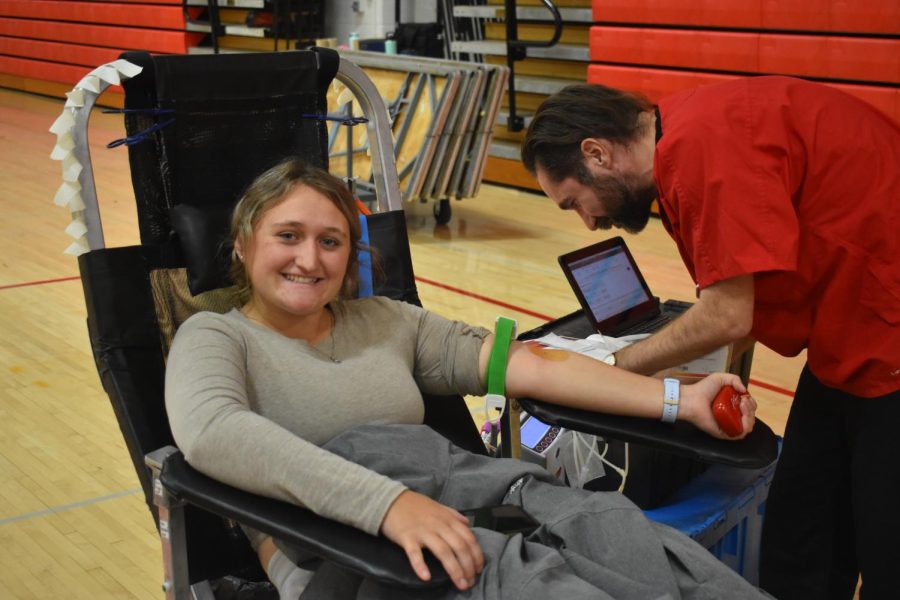St. Louis NHS hosts blood drive
Jacie Burnham sits in the chair as she gets ready to donate blood.
September 21, 2022
The St. Louis High School National Honors students are hosting a blood drive Thursday, Sept. 22. This will be taking place in the morning from 8 a.m. until 1 p.m!
The NHS will be providing water, juice, granola bars, cookies, chips, and other goodies to consume before donating! It is important to eat before donating blood so there aren’t any complications during the process. Feeling dizzy, nauseous, or faint, are common warning signs that one is ill-prepared for the procedure. Eating and drinking before donating can enhance and balance your blood sugar levels to stay safe during the donation.
What will be expected from someone when donating blood? As reported by, Ncbi.nlm.nih.org, the procedure is as follows: checking blood sugar, pricking of the finger to check Hemoglobin levels, if Hemoglobin levels are steady one will then be directed to a phlebotomist. There they will select a vein, disinfect the vein, Perform the venepuncture, monitor the donor and donor unit, remove the needle, and collect the sample.
Donating blood can help in many different medical ways including surgeries, cancer treatment, chronic illness, and other traumatic injuries. A pint of blood taken from each person that cares to donate can save a life or many others. Of course, the age requirement for donating blood is 17 unless authorized by a parent, 16. Annually, around 6 million people around the country donate blood. Altogether, this can add up to 13 million pints of blood. Millions of lives can be saved with just a pint or two so medicinal facilities have a strong urge to donate if possible!
According to Oneblood.org, “Your blood type is inherited and everyone’s blood type falls into one of eight types. There are very specific ways in which blood types and blood components must be matched for a safe transfusion. This is why it is important that you Target Your Type with the best donation method for you.”
In total, there are eight different blood types and each one can uniquely save another life. The eight blood types include, in no specific order, O-, O+, A+, A-, B-, B+, AB-, and AB+. There are many different methods of donating blood! According to many health organizations, whole blood donation, double red cell donation, platelet donation, and plasma donations are the many different methods of donating blood.
Jazsmin Harbor, a senior at St. Louis High School, said, “I have never donated my blood before, but I have thought about doing it before in the past. It is a great cause to donate to, and can save many lives. Personally, I strongly urge others that can donate, to do so!”
Izabelle Hrabal, a senior at SLHS, explained, “I am very excited for tomorrow! It’s kind of comical, I actually find the blood drive fun. This will be my second time doing so, and I am glad that I am donating for a good cause”
The National Honor Society is looking forward to seeing all of the students Thursday!


